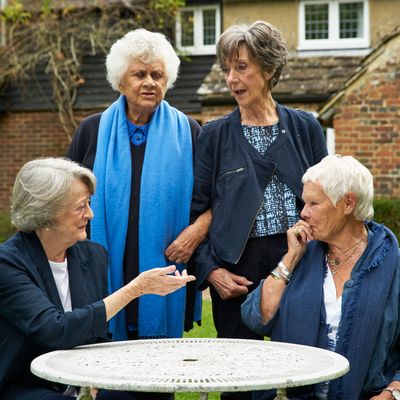
If you could spend the weekend in the English countryside drinking tea and champagne with anyone, who would it be? I’m pretty sure the answer would be the subjects of IFC Films’ new documentary Tea With the Dames: Dames Eileen Atkins, Judi Dench, Joan Plowright, and Maggie Smith. The four renowned actresses are also longtime friends, and in this film they get together at the cottage Plowright once shared with her husband, Laurence Olivier, where they reminisce about the old days, lament the aging process, discuss their craft, and laugh. A lot. The old friends cover a whole host of topics, all of which I would have listened to them go on about for hours, but here are 11 of the best takeaways from our quick visit to the English countryside with these four legends, who also happen to be a real hoot.
Judi Dench will give you all the advice about becoming a dame that you really need.
Each of the ladies shares what it felt like to be named a Dame by the Queen: It was a tremendous honor not just for them, but for the people who helped get them there; more than that, Joan Plowright points out that it represented a sort of acceptance of her career on a grand stage. But becoming a Dame can be nerve-wracking, so sharing advice with the newbies is of the utmost importance. Judi Dench has the right idea (she was the first of the four to become a Dame). When the honor was bestowed upon Maggie Smith, Dench called her up to congratulate her and give her some thoughts on the whole thing: “It doesn’t make any difference, you can still swear.” And this is why we all want to have tea with these dames. And also champagne.
All four actresses still get nervous when they’re working.
People might assume that after all the awards and accolades and just working in the business for as long as they have, our four dames would’ve conquered stage fright or on-set nerves — but the women don’t hesitate to set the record straight: All four of them suffered from insecurities and fear throughout their careers — it never goes away. Eileen Atkins remembers suffering from intense doubt and fear every day on her way to the theater, thinking, “Would you like to be run over now?” and barely being able to answer, no. Dames: They’re just like us! And it’s not just early in their careers: Both Smith and Dench talk about fear on film sets. They don’t want to be the person who messes up a take and has to endure all the passive-aggressive sighing from everyone else on set. Don’t these ladies know who they are? As if anyone would step to Smith, Dench, Atkins, or Plowright if they flubbed a line.
Set-photographing ain’t easy.
Poor Mark! Mark is the on-set photographer of Tea With the Dames and he takes a lot of shit. The ladies are not pleased with the angles he’s chosen for their group photo — it’s just not kind to old ladies, Eileen Atkins tells him — and Maggie Smith even goes so far as to ask if this is Mark’s first day. It’s not a knock on him! Everyone has to start somewhere! Later, Mark starts taking photos while Maggie Smith is talking about the insane amount of reaction shots she and Alan Rickman had to come up with on the Harry Potter movies, and Smith is not having it. She thinks Mark has taken enough photos for a while and dismisses him. It sounds a little harsh, but let’s be honest — Mark is having the time of his life. Oh, to be bossed around by Professor McGonagall!
There’s a paramedic out there who should be very, very scared of Judi Dench.
Like, very scared. There’s a lovely little section in which the four actresses reflect on aging. Perhaps “reflect” is the wrong word, since these ladies are never overly sentimental. Instead of waxing poetic about how fleeting life is, they talk more about the practical parts of getting older — how much of a pain in the ass it is. There’s discussion of hearing aids (“You need to get them, Jud,” Smith tells her reluctant buddy Dench), and poor eyesight (they laughed when producers suggested printing out materials for the ladies to look at), and even how gauche it is to talk about planning your funeral. But what Judi Dench really can’t stand about getting older is how patronizing everyone gets, including paramedics who come to your rescue. I don’t want to ruin the entire story for you because it is an actual delight, but know that it starts with Judi Dench getting stung by a bee on her butt and ends with her yelling, “You fuck off! I’ve just done 8 weeks in The Winter’s Tale at the Garrick Theatre!” The story is honestly worth the price of admission for this thing.
The Dowager Countess has not watched Downton Abbey and that feels very on-brand.
At one point, Maggie Smith and Judi Dench are Sitting on a Couch Together — very much a show I would watch — which is hilarious in and of itself because of how ridiculous they find it (“When have we ever sat like this?”), but it also provides the backdrop for one of the best moments of the entire film. Mags and Jud are talking about some of their bigger productions, and when Judi asks Maggie how many episodes of Downton Abbey she did, she can’t answer. And then we’re privy to a secret between friends: Maggie whispers that she hasn’t seen the show yet even though they gave her a box set of DVDs: “I haven’t got time.” Whether this is method acting or not, you’ll never love Maggie Smith more than in this moment.
We have Judi Dench’s late husband to thank for her turn as James Bond’s M.
Judi Dench played James Bond’s superior, M, for 17 years (from GoldenEye through Skyfall), but when she was initially asked to take on the role, she was a little taken aback. It was her husband, actor Michael Williams, who pushed her to do it. She says he told her, “I long to live with a Bond woman,” and so she obliged. The world is forever grateful.
These four dames will make you cry with their advice to their younger selves.
Again, this lot is in no way sentimental or schmaltzy (typical Brits, you know), but their responses are so thoughtful when asked what advice they’d bestow upon their younger selves, should their younger selves listen (Smith isn’t so convinced). Plowright would tell herself to get into mindfulness and meditation, things she relies on now. Atkins wishes she wasn’t so bad-tempered and that she listened more. Maggie Smith gives such a Maggie Smith response: “When in doubt, don’t,” which I’ll now go get tattooed on myself. Judi Dench is the most wistful: “Try not to be so susceptible to falling in love,” she offers up. Her friends promptly boo her for being so forlorn about the whole thing. When they mostly agree that it’s too late to change anything now anyway, Joan Plowright chimes in, “It’s never too late.” It’s not fair because they’re all drinking champagne and I’m not and I am having a lot of feelings about all of this.
“Dame Judi Dench” is the perfect tongue twister for all your vocal warm-up needs.
The film is bookended with the four dames doing some vocal warm-ups — you know, your typical “red leather, yellow leather” stuff, but then they pull out the twistiest twister of all: “Dame Judi Dench.” Seriously, say it out loud. Now, faster. It’s hard! Dame Judi Dench herself gets it, and so does Eileen Atkins, but Maggie Smith stumbles a bit. Is this the real way Dame Judi Dench prepares for a scene? It should be! She’s earned it.
Eileen Atkins doesn’t think she needed the sixties to have a good time.
And neither does Judi Dench! These two were the wild ones of the bunch, it seems; they were just living and loving and rocking some fine-as-hell outfits during the tumultuous 1960s. But aside from the photos and footage of their great wardrobes during their discussion of the decade, this section of the film also gives us a great Vanessa Redgrave story. Both Atkins and Dench were part of the Vietnam War protest in Trafalgar Square. Atkins and Dench ran off when things got bad, but Dench remembers one glorious detail about their friend and fellow stage actress: “Vanessa got arrested and remembered she had a matinee.” What a time!
These women are the best of friends; you know this because they revel in calling out Judi Dench for taking all of their parts.
When asked if they’d like to continue working for as long as they can, they all respond with a Yes — as long as they keep being asked. But the friends aren’t above some playful ribbing of their pal Jud, who seems to get asked more than anyone else. Judi Dench starts to take offense, but Plowright has a story to back up the claim. Her American agent told her that they could look for “a nice little cameo role that Judi Dench hasn’t got her paws on!” Rude, but true. More than just revealing some cheeky little friendship moments, this all demonstrates that these legendary actresses want to keep working — so people should keep asking.
Basically nothing has changed in regards to women being judged on their looks.
Not that this is surprising to anyone, but even legendary stage and screen actresses have had to put up with bullshit over their looks from the very start of their careers. Before sending her off to chase her dream, Joan Plowright’s own mother told her, “You’re no oil painting, my girl, but you have the spark.” Eileen Atkins has a similar story about being introduced by a teacher to another actor; she overheard the teacher express concern that although she was a good actress, she wasn’t pretty. The actor’s response, however, changed Atkins’s whole mindset: “No, she’s not conventionally pretty in any way, but do you know what? She’s sexy.” And so she went on her merry way.
The focus on their looks clearly stayed with all of the actresses: All four feared playing Cleopatra in any production of Antony and Cleopatra. Judi Dench’s assessment on being cast in the 1987 National Theatre production of the play is perhaps the most famous: She told director Peter Hall that he had just cast a “menopausal dwarf” to play the great beauty. Maggie Smith would only take the role in a Canadian production for fear of being laughed out of London. And Eileen Atkins turned down the role four times before agreeing to it because she didn’t “have the courage” to take on Cleopatra and all the critics. So basically what they’re saying is, SAME AS IT EVER WAS.


